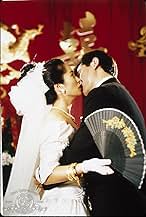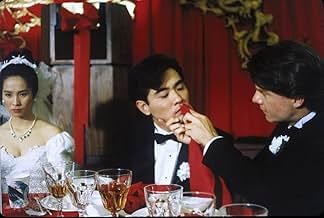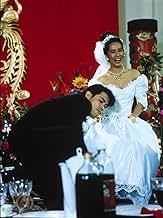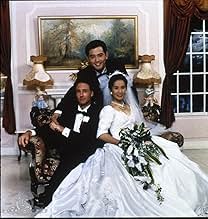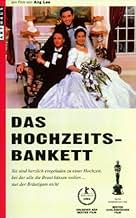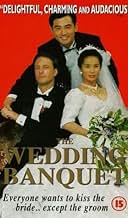To satisfy his nagging parents, a gay landlord and a female tenant agree to a marriage of convenience, but his parents arrive to visit and things get out of hand.To satisfy his nagging parents, a gay landlord and a female tenant agree to a marriage of convenience, but his parents arrive to visit and things get out of hand.To satisfy his nagging parents, a gay landlord and a female tenant agree to a marriage of convenience, but his parents arrive to visit and things get out of hand.
- Nominated for 1 Oscar
- 13 wins & 11 nominations total
- Mrs. Gao
- (as Ah-Leh Gua)
- Director
- Writers
- All cast & crew
- Production, box office & more at IMDbPro
Storyline
Did you know
- TriviaThe Wedding Banquet (1993) has the highest cost-to-return ratio of 1993, earning $23.6 million from a budget of $1 million. This gave it a of 23.6 ratio, considerably higher than 1993's biggest money-maker "Jurassic Park" whose ratio was 13.8.
- GoofsDuring the small family dinner to which Simon treats the newlyweds and Wei-Tung's parents, Simon can be seen to alternately hold chopsticks, a small bowl or nothing in his left hand, depending on the camera angle.
- Quotes
Justice of the Peace: Okay, now you: "I, Wee-Wee..."
Wei-Wei: Wee-Wee.
Justice of the Peace: "... take you, Wai Tung..."
Wei-Wei: Wee-Wee.
Justice of the Peace: Okay. "To be my wedded husband... to have and to hold..."
Wei-Wei: Holding to have, husband, mine...
Justice of the Peace: "... for better, for worse, for richer, for poorer..."
Wei-Wei: Better and richer, no poorer.
Justice of the Peace: "... in sickness and in health, till death do us part."
Wei-Wei: Till sickness and death.
Justice of the Peace: Groovy. Rings.
- SoundtracksThe Wedding Banquet
The script by director Ang Lee, and associates Neil Peng and James Schamus have written a crackerjack story full of things that never have hit the screen before. The wedding banquet itself is full of such insightful details about contemporary Chinese-American life and sentiment that there seems something accomplished that's new to the movies. When the wedding party invades the honeymoon suite, you feel like the writers have a firm grasp on the people they are presenting us, as if they know them, inside and out. I have seen five movies directed by Ang Lee, and this (and maybe his earlier "Pushing Hands") is the only one in which I felt he had a deep understanding of the characters, and for that matter, of human nature and human love.
Filial piety may not be a new thing for the Chinese, and maybe that is why this movie feels rooted, grounded. Wai-Tung who is a successful businessman and landlord commands respect among his colleagues, but when he's with his parents, he's still their little boy. You laugh as this grown man walks with his father, head bowed, keeping exact pace, two steps back, and you realize the secret of the older man's hold on his imitator. Wai-Tung loves his parents, and he knows what they expect. He's ashamed that he doesn't want to fulfill their dreams, that he wants a life of his own, that he didn't turn out as they hoped. But he also cares about his lover Simon, and you know what has drawn them together is that they care about other people. (Simon is a physical therapist who likes lecturing his clients; Wai-Tung tries to appear in charge, but he always seems to be taken advantage of by the people around him.) This concern for others is what draws us to Wai-Tung, and when his parents appear, you know exactly why he's going along with deceiving them.
Winston Chao is handsome and lithe, and he's good at playing a frazzled, bewildered, well-meaning lump. Yet he wouldn't be so likable, if it were not for the propinquity of Mitchell Lichtenstein who clearly has the expressiveness the movie needs. Although the movie comes dangerously close to being one about gay men in love who, in their most private moments, look like the most they do is shake hands, Lichtenstein ("Streamers") manages with the subtlest means to convey a sexual connection. The scene in which Simon presents a cell phone as a gift and carries on a conversation to test it affords Lichtenstein the chance to show what heat he can generate on the screen when he's called to do so. It makes evident how lucky a man Wai-Tung is, and why he'd allow himself to be emotionally torn for so long.
But the most compelling performances here come from Sihung Lung (who played the unwanted father-in-law in "Pushing Hands") and Ah Lei Gua as Mr. and Mrs. Gao. Lung conveys Old-World benevolence that pretty much dictates where this movie goes. He more than fills the shoes of the aging warrior, taking the last few steps that will make his life complete. He grants Mr. Gao a share of dignity his work here rightly deserves. Yet it is Ah Lei Gua who convinces me that she is fully in character. Whether she is bursting into tears over the shabbiness of the civil wedding, or trying to overlook her daughter-in-law's clumsiness in the kitchen, or keeping Simon at a distance when she learns his real position in her son's life, you sense an actress of the highest rank who knows intuitively the character she has been given to play.
With May Chin who, I hear, is very popular in Taiwan, and here carries herself with porcelain elegance. Her Wei-Wei is an enigma, a woman with a penchant for handsome gay men, and the movie is content with leaving her that way. You come away as uneasy about the arrangement she struck with Simon and Wai-Tung as Mrs. Gao is, who exits weeping. When Ang Lee slows down the camera at the end, as Mr. Gao raises his arms to be inspected at the airport gate, the director in spite of himself belies the thought that the old soldier has surrendered to a new enemy--the craziness and the self-indulgence of the next generation. The plangency of that last shot remains with you for a long time.
- How long is The Wedding Banquet?Powered by Alexa
Details
- Release date
- Countries of origin
- Languages
- Also known as
- El banquete de bodas
- Filming locations
- Production companies
- See more company credits at IMDbPro
Box office
- Budget
- $1,000,000 (estimated)
- Gross US & Canada
- $6,933,459
- Opening weekend US & Canada
- $134,870
- Aug 8, 1993
- Gross worldwide
- $6,933,459
- Runtime1 hour 46 minutes
- Color
- Aspect ratio
- 1.85 : 1
Contribute to this page




